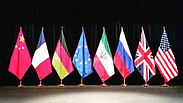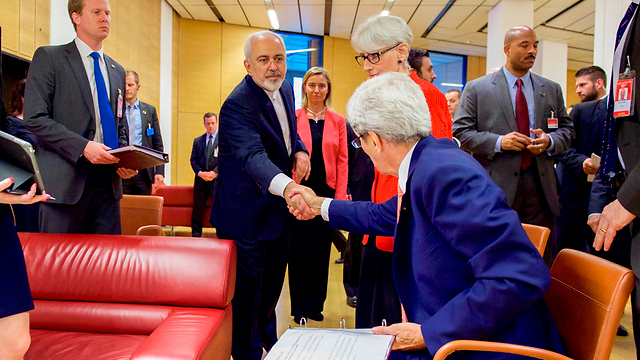
Flags of the countries which signed the nuclear deal
Photo: Eldad Beck
US President Barack Obama said in an interview with great American TV host John Stewart that he had no illusions about Iran, which is controlled by "an anti-American, Anti-Israel, anti-Semitic" regime that sponsors terror organizations.
Winston Churchill persistently refused to hold even indirect negotiations with the Nazi regime in Germany and warned of a moral slippery slope such talks could deteriorate to. The Nazi enemy, he said, has to be crushed. On the other hand, he was willing to hold negotiations and even signed agreements with a different enemy – the Stalinist regime.

"Sounds like a good partner for peace," Stewart commented ironically. "Well, it's been said frequently you don’t make peace with your friends," Obama replied, without any irony.
Obama's claim is ancient, but that doesn’t make it true. There are enemies with whom a decent person would enter concrete agreements with a limited goal, and there are enemies that not a single decent person would shake hands with.
Iran Deal Aftermath
Daniel Friedmann
Op-ed: In addition to security-related compensation following the Iran deal, we should try to get US President Obama to issue a firm and unequivocal declaration that Israel is subject to selective and unjustified enforcement on the international level.
The distinction between evil and evil is not obvious, unequivocal or subject to scientific ranking. It is affected by the statesmen's nature, the international state of mind, and of course interests. President George H. W. Bush refused to reach any compromise with Saddam Hussein apart from his full surrender to the American ultimatum; when there was surrender, the bombers took off and the missiles were launched. Bill Clinton did the same with the Milošević regime in Serbia. With Syrian President Assad, on the other hand, America was always interested in reaching agreements.

American and Iranian foreign ministers shake hands in Vienna. The representatives of the leading Western states should have demanded that the Iranian regime adopt the Arab League's peace initiative as an inseparable part of the nuclear agreement (Photo: Reuters)
In the Iranian case, the choice between the different shades of evil is not as complicated as what meets the eye. If all the qualities that Obama found in the current Iranian regime are true, and they are, the comprehensive nuclear agreement signed in Vienna should have included an explicit, written and signed commitment for a gradual change in its nature. Not a change in its essence – the regime in Tehran will remain religious and fanatic as long as the Iranian people don’t rebel against it – but a change in its conduct towards civil rights, the distribution of poisonous propaganda against America and Israel and its military support of terror organizations.
The failure to mention these issues in the final document is both a moral and realistic failure by all those who signed it, and especially the US, France and Germany. Including the expression "civil rights" in the nuclear document was feasible considering the Iranian side's weakness, and would have blown a new wind in the democratic Iranian opposition's sails. And not just the Iranian; the Middle Eastern tyrants would have concluded that even in its ambition to reach agreements which serve its own interests, America is not giving up and is not folding the flag of the liberal democracy.
As for us, the representatives of the leading Western states should have demanded that the Iranian regime, as an inseparable part of the nuclear agreement, adopt the Arab League's peace initiative. This initiative, as we know, includes a willingness to fully recognize the State of Israel and normalize ties with it, in return for an Israeli withdrawal from the territories. No more, but no less either.
Recognizing Israel's right to exist is a way to examine democratization in Arab-Muslim regimes. When Iran was ruled by reformist President Mohammad Khatami, the nuclear initiative was halted – and at the same time, the statements against the State of Israel were softened, up to a willingness to accept its existence. The opposite happened during the days of President Mahmoud Ahmadinejad.
German Economy Minister Sigmar Gabriel understood that very well. During his visit to Tehran last week, he made it clear to his hosts that they must stop depicting Israel as Satan and immediately recognize its existence. The German minister was thereby trying to fix the agreement's failure. It's an attempt which has yet to succeed.
Those who signed the Vienna agreement signed it, without admitting to it, on Israel's behalf as well – and according to US Secretary of State John Kerry's comments, in Israel's favor – although they were not authorized to do so.
It happens quite often in the history of small nations that world powers decide what is good for them. They sometimes make the right the decision, and they sometimes make the wrong decision. It’s usually the wrong decision.

















